The Autumn Statement – nothing but a sticking plaster for domestic violence services
Thursday, November 24, 2016
On 20th November we blocked bridges across the UK to demand the government stop blocking survivors’ bridges to safety through cuts to specialist services. We also hijacked London tube ads to spread the message about our demands: a secure, long term funding plan for domestic violence support that includes specialist services and support for all survivors, including black, brown and migrant survivors.
Yesterday saw the first financial statement of Theresa May’s government. The Autumn Statement traditionally sets out a government’s plans and priorities. Although May claims she wants to end violence against women and girls, the statement contained no real measures at all that will help achieve this.
So what were we offered today? £3 million from the “tampon tax”. You know our views on that – a sticking plaster on the hemorrhaging caused to domestic violence services by austerity. This tiny pot of money is a drop in the ocean compared to the amount of money that has been snatched from these services since 2010. It’s not a long-term plan, and services will have to fight for it. It’s just not enough to save lives.
But what else does the Autumn Statement mean for us?
Universal Credit
All week the press have speculated about about new money being offered for “just about managing” families, sometimes crassly referenced as ‘Jam’. There were no such lifelines thrown today. The minimum wage was increased, sure, but to nowhere near the levels needed for a living wage. A change to universal credit allowed just 2p for every extra pound. Whilst this means a gain of £500 for a family, cuts to work allowance will see a £2800 loss.
Furthermore , the government continues on with its bull-headed Universal Credit crusade, despite strong evidence that it is a danger to those experiencing domestic violence.
Discrimination
Back to the ‘just about managing’. The narrative is one of the deserving poor, who the government deem worthy of state support, vs. benefit scroungers. Those that do not fit into the model of ‘deserving’ poor are cast out, blamed and viewed as a burden. This props up a misogynist and racist vision of who is and isn’t allowed support.
Domestic violence survivors who are not working (usually because they are prevented from working by controlling partners), those fleeing violence and those with ‘no recourse to public funds’ are trapped in a vicious bind and forced to stay in abusive situations with no help from a negligent state – like the 52% of survivors who can’t afford to leave a violent relationship.
Paltry giveaways after six years of vicious austerity are a dangerous front. Enormous welfare cuts have been left in place, and many of these – such as the benefit cap – disproportionately affect women and non-binary people. This budget has made no attempt whatsoever to redress the huge gender imbalance in terms of the impact of austerity, and the small reprieves announced will overwhelmingly benefit men. As the Women’s Budget Group pointed out ‘Increasing the personal tax allowance will do nothing to help those earning too little to pay income tax (65% of whom are women). Raising the 40p threshold will largely benefit men since 72% of higher rate taxpayers are men. Together with the freeze in the fuel duty, these measures benefit men and the better off.’
£23 billion towards…infrastructure
There is a deep and bitter irony in the knowledge that domestic violence costs the UK economy £23 billion a year, never mind the immeasurable personal trauma that spans generations. Yet, once again, the government has completely failed to realise that investing in domestic violence support would be both life-saving and money saving. If they really only care about money, it economically makes much more sense to support survivors and work to prevent domestic violence.
The government have offered this exact sum – £23 billion – towards infrastructure, including housing. But how much social housing will this include? It’s not guaranteed. And the vision of “infrastructure” does not recognise women and non-binary people. Where is the funding for social infrastructure – domestic violence services, mental health services, social care and childcare? Women and non binary people, particularly migrants, will continue to provide the free or cheap labour needed to prop up the government’s vision of “infrastructure”.
This Autumn Statement reinforces the white male power that underpins the violence we face. It’s clear who benefits from the cut in corporation tax – not us.
The Autumn Statement offers no hope for survivors of domestic violence. Austerity reigns on, and the government continues to target the people they perceive as powerless. We are those people. We will not be silent whilst the government props up perpetrators by blocking survivors’ bridges to safety. We will keep fighting, because our lives depend on it.
PRESS RELEASE: You Block Our Bridges, So We Block Yours
Monday, November 21, 2016
14:00 Sunday 20th November 2017
“You block our bridges, so we block yours”: domestic violence survivors take action ahead of the Autumn Statement
-
Sisters Uncut block bridges across the UK in advance of the Autumn Statement.
-
Theresa May is “blocking migrant domestic violence survivors’ bridges to safety”.
-
The group demand secure funding for specialist BME services, because 4 out of 5 BME women who approach refuges for help are turned away
-
Sisters Uncut demand a strategic plan for ALL domestic violence survivors, regardless of immigration status, that supports black and brown, disabled and LGBT+ survivors.
E-mail: [email protected]
Twitter: @sistersuncut
On 20th November 2016, three days ahead of the new government’s first Autumn Statement, direct action group Sisters Uncut blocked bridges across the UK to demand secure funding for domestic violence services. Around 600 women and non-binary people participated in the actions nationwide.
Police presence was moderate, with no arrests made.
At 13:00, groups in London, Newcastle, Glasgow and Bristol blocked bridges, set off smoke flares and chanted “20 million is not enough!”. Sisters Uncut criticise Prime Minister Theresa May’s pledge of £20m of temporary funding for domestic violence services, available to service-providers via a bidding process, as a ‘sticking plaster on a haemorrhage’. In a statement released last week, the group say that May is failing to secure funding for specialist services:
“Many of the services lost in austerity were set up and run by women of colour for women of colour, because generic services did not meet their needs. Those needs remain unmet, and women of colour and migrant survivors remain more likely to be trapped in violence, without any support”
A 2015 report by Imkaan, the only UK-based organisation dedicated to addressing violence against black and minority ethnic (BME) women, showed that 9 in 10 BME survivors prefer to receive support from a specialist BME organisation. Despite this, most of the support services destroyed by austerity were those supporting African and Caribbean and Asian communities, and LGBT+ people.
Bridges were blocked because the group state that migrant women fleeing domestic violence have their ‘bridges to safety’ blocked by “no recourse to public funds” restrictions, which mean they cannot access refuges or benefits, and remain trapped facing life-threatening violence. Sisters Uncut demand that this barrier is lifted and that “safety is not subject to immigration status”.
The group demand that the government produce a long-term strategic plan for safety from domestic violence, which recognises the specific needs of different survivors. Current funding models are chaotic and temporary.
Quotes:
Marcia Smith, a domestic violence survivor from Doncaster who attended the Newcastle action, says: “When I went to the police with bruises, they said they couldn’t see my bruises because I was black. People don’t see black women as victims, and we get racism instead of help. With black services, you don’t have racism, you have the trust and support you need”
Nadine, a Sisters Uncut member, says “As domestic violence services shrink, Sisters Uncut will continue to grow. We will not stand by as black and brown survivors are left stranded in abusive homes without the bridges to safety provided by specialist domestic violence services, whilst migrant survivors with ‘no recourse to public funds’ find all of their bridges blocked by the government’s immigration policies.”
Notes for Editors:
-
Sisters Uncut are a direct action group protesting cuts to domestic violence services. The group was formed by domestic violence survivors and sector workers in 2014 to defend domestic violence services from austerity cuts, and has blossomed into a mass movement across the UK, with groups in Doncaster, London, Newcastle, Bristol, Portsmouth and Birmingham.
-
Sisters Uncut is formed of non-binary people and women renowned for bold protest tactics, including jumping on the red carpet at the ‘Suffragette’ premiere and dying the Trafalgar Square fountains red.
-
In 2015, Women’s Aid reported that refuges are being forced to turn away 2 in 3 survivors who approach them to safety. Reasons for refusal range from lack of space to a refuge being unable to meet a survivors’ needs (such as language or disability). Women’s Aid data shows that for BME women, that number rises to 4 in 5 turned away.
-
Imkaan is a UK-based, black feminist organisation dedicated to addressing violence against women and girls.
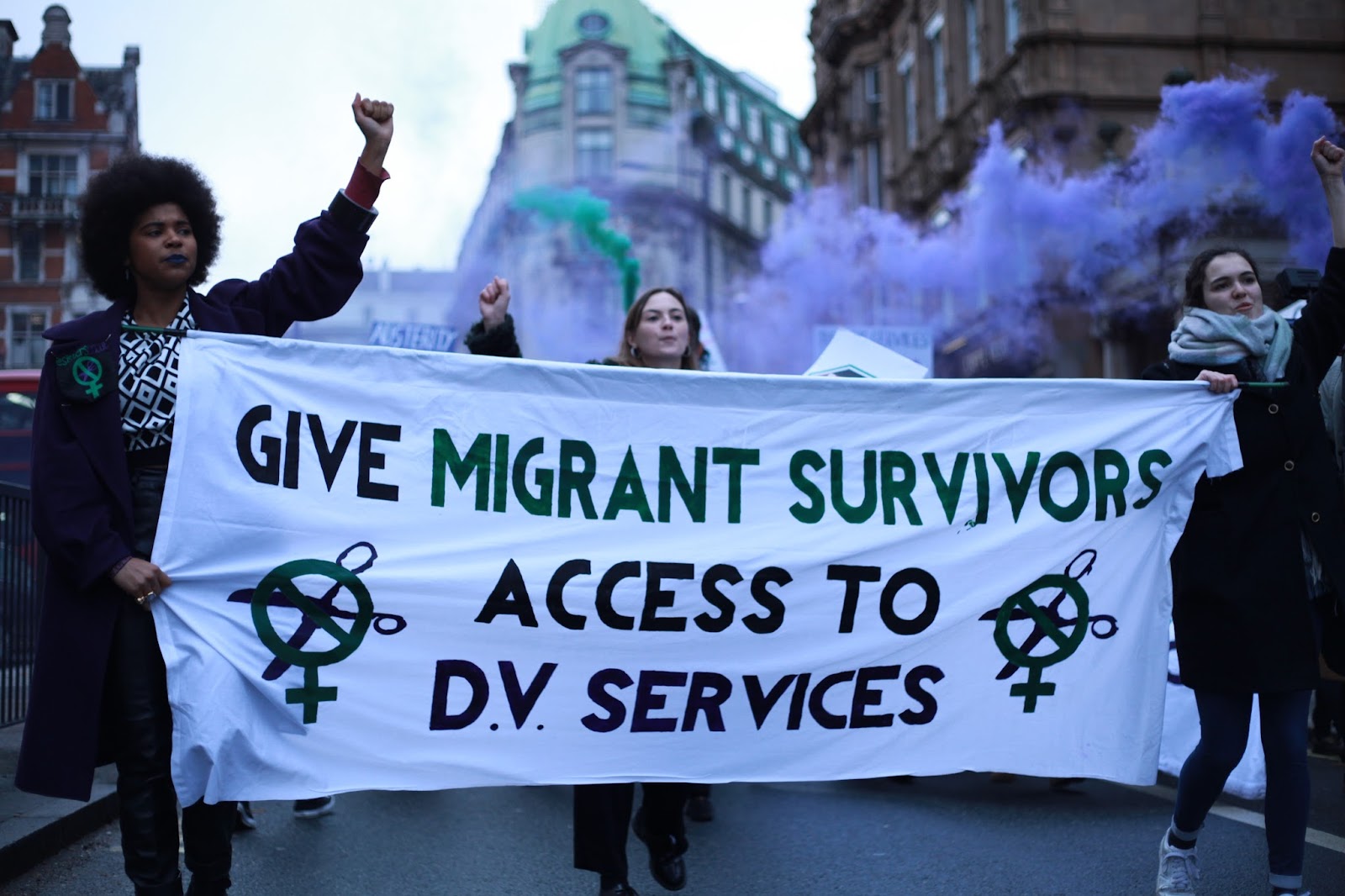
CREDIT: Guen Murroni (London, Waterloo Bridge)
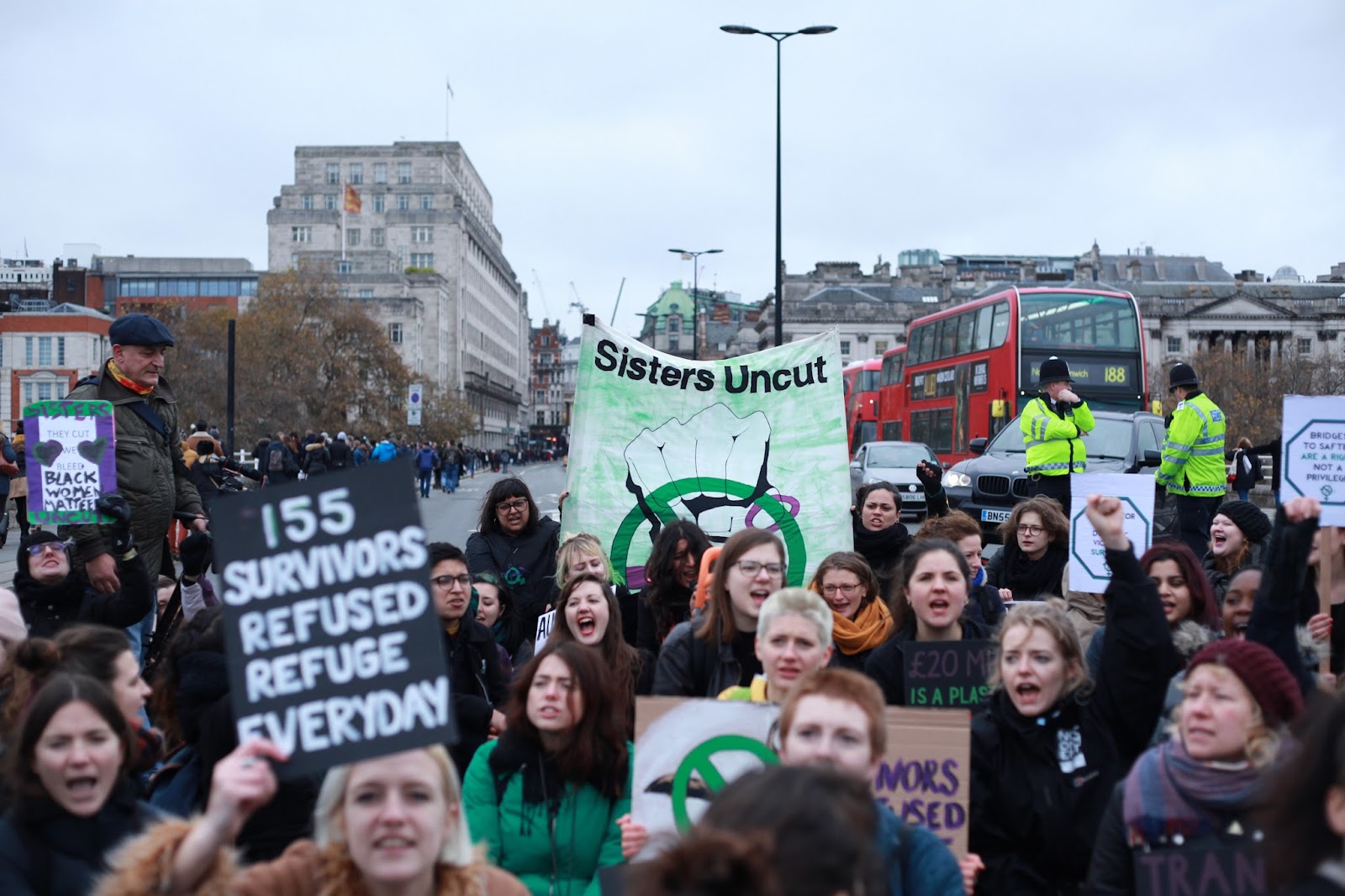
CREDIT: Guen Murroni (London, Waterloo Bridge)

CREDIT: Claudia Moroni (London, Waterloo Bridge)
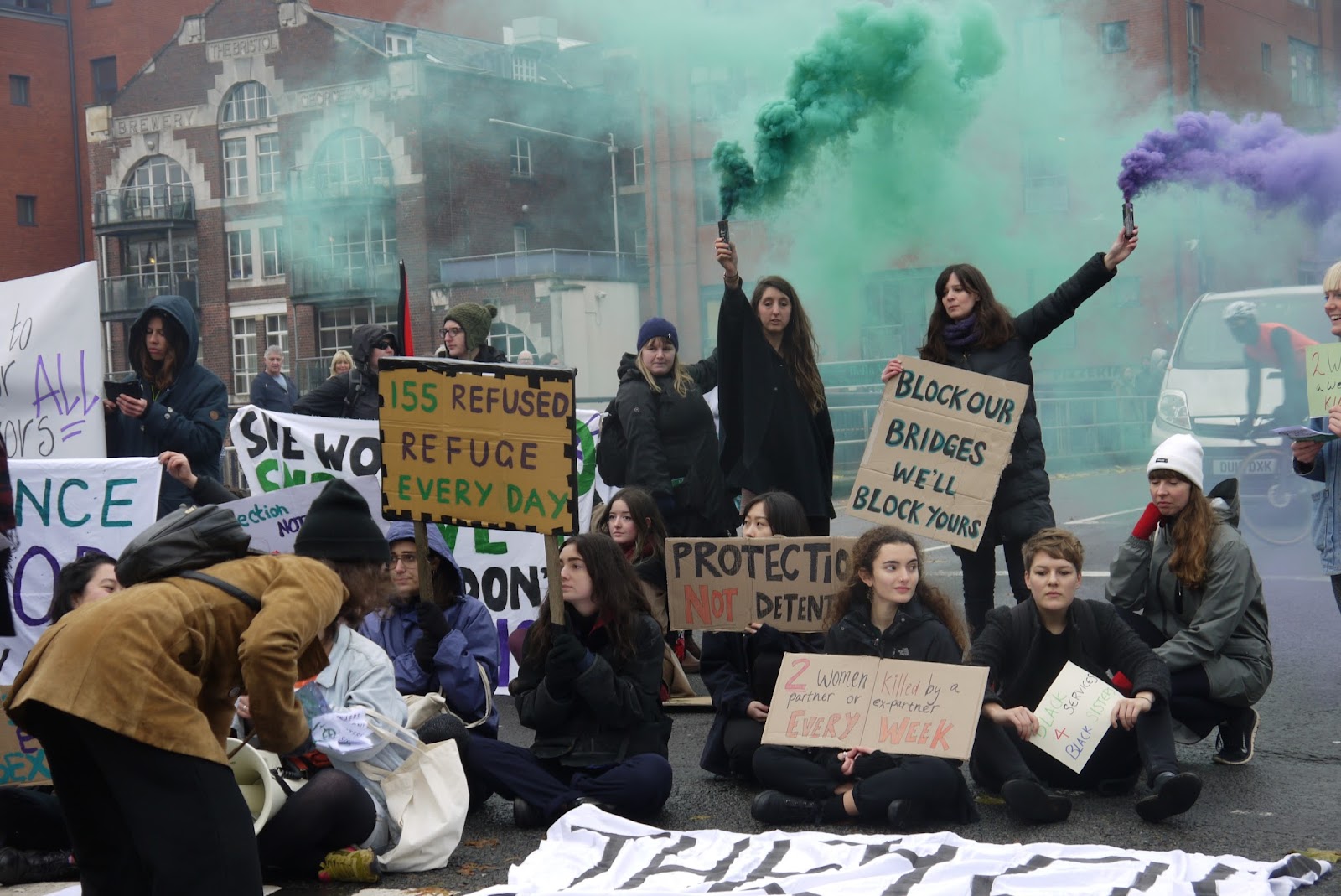
CREDIT: Bristol Sisters Uncut (Bristol Bridge/ Redcliffe Bridge)
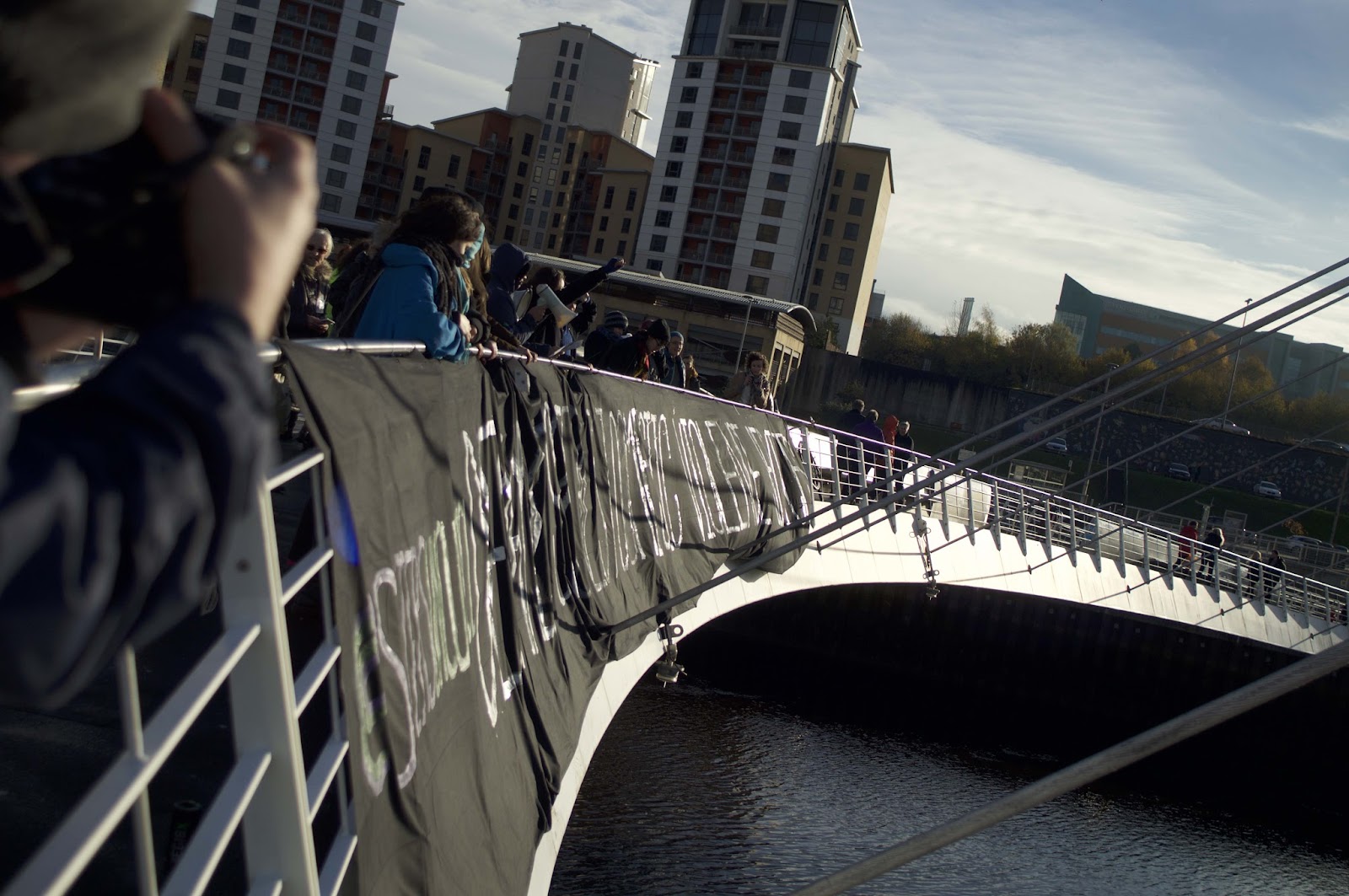
CREDIT: Newcastle Sisters Uncut (Millennium Bridge, Newcastle)
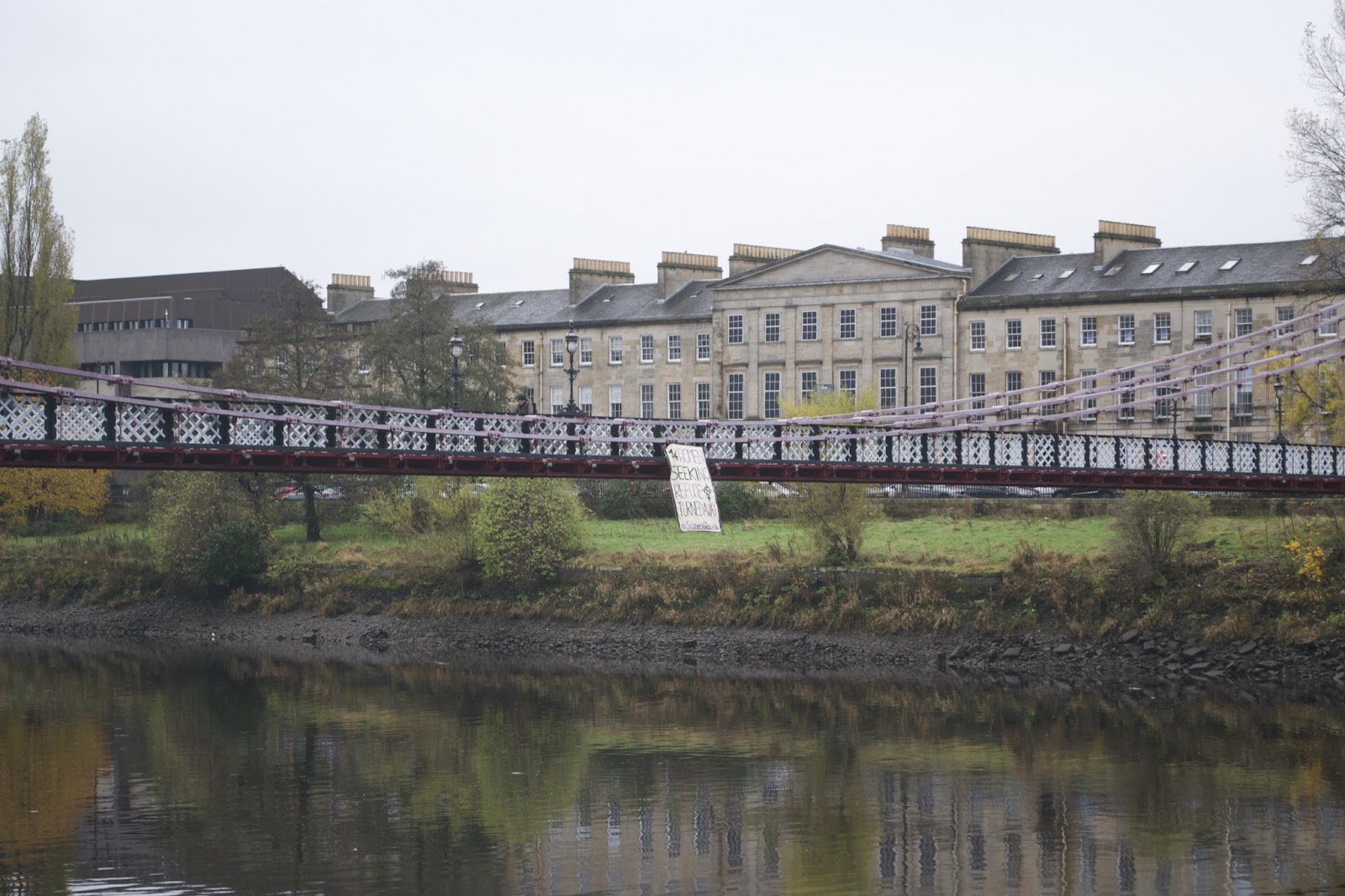
CREDIT: Sisters Uncut Glasgow (South Portland Street Suspension Bridge)
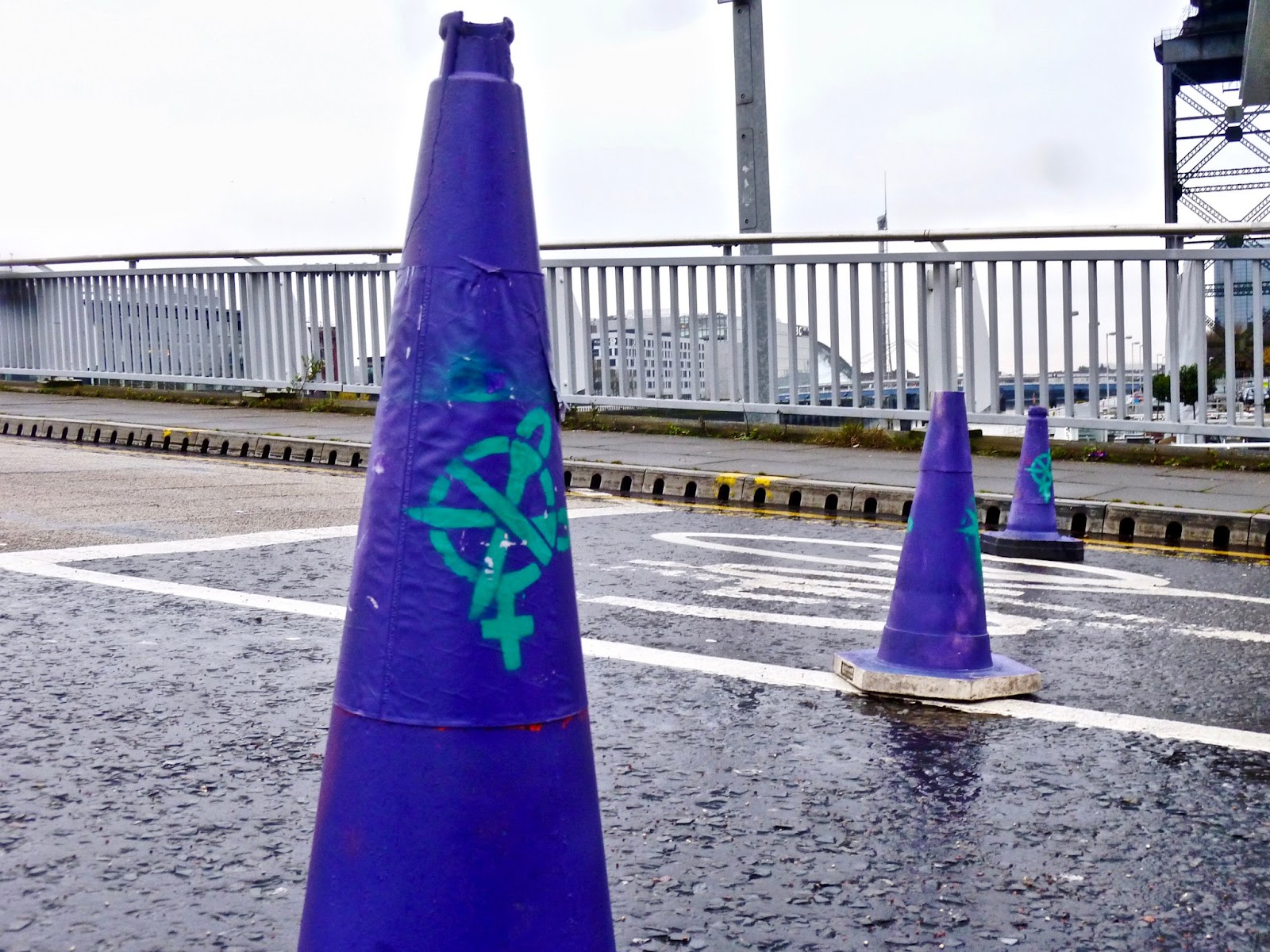
CREDIT: Sisters Uncut Glasgow (South Portland Street Suspension Bridge)
Sisters Uncut UK Day of Action!
Monday, November 14, 2016
Theresa May’s £20 million funding announcement for domestic violence refuges is a sticking plaster over a haemorrhage. After 6 years of Tory cuts, the outlook for non-binary people and women trying to escape domestic violence is increasingly bleak, with survivors being trapped in violent homes by Tory policies. Support services have been decimated by austerity, and this comparatively tiny pot of money will not restore them.
The £20 million is a short term fund covering just 2017-18. Services will be forced to bid for the centralised fund, pitting local services against each other and ensuring that larger, generic services are much more likely to win funds due to their resources. This fund will not reach the smaller, specialist refuge providers who desperately need it – especially culturally specific refuges that provide life saving support for women and non-binary people of colour. These are the providers who have already been hugely disadvantaged by the “competitive tendering” processes that local councils use to fund services.
Theresa’s £20 million is not enough. It will not reach the services that need it most, and black, brown and migrant women will be blocked from accessing it.
Black, brown and migrant women face a higher risk of domestic homicide. Hostile immigration control measures directly contribute to this by blocking survivors’ paths to safety.
Hostile immigration controls, many of which were implemented by Theresa May as Home Secretary, make life infinitely more dangerous for migrant survivors of domestic violence. Just one example is the Immigration Bill 2014, which forced private landlords to run immigration checks on tenants, commonly known as the ‘right to rent’. This leaves undocumented migrants or those fleeing without their documents unable to access safe housing.
Calling the police is simply not an option for many survivors of colour who risk racism and violence in response, and undocumented migrants face the additional risk of detention and deportation.
Refuge spaces are funded through housing benefit, so migrant non-binary people and women with ‘no recourse to public funds’ (no access to state support) – a common restriction placed on migrants – have no access to refuges, social housing, benefits or healthcare. Survivors of colour are being disproportionately turned away from refuge services. Women’s Aid statistics show that 2 in 3 women who approach refuges for help are now being turned away. For BME women, that figure rises to 4 in 5.
In this climate, specialist domestic violence services for women and non-binary people of colour are more vital than ever – but cuts and closures have left them in crisis.
Specialist BME domestic violence services are independent, specialist and dedicated services run by and for the communities they seek to serve. Survivors report that they are more likely to access these services and feel safer with them. Research by Imkaan, the UK umbrella organisation for BME violence against women and girls services, found that 67% of BME VAWG organisations feel uncertain about their futures. Problems include uncertainty in funding, an unequal playing field when bidding against larger generic providers, and an increased demand for support that doesn’t match local authority funding. Services for Black survivors are often entirely absent, even within BME specialist services. These life saving services are having to fight for their own existence rather than supporting the survivors who need them.
Theresa May claims she wants to end violence against women and girls. To do that we need an awful lot more than refuges. We need a long term, sustainable funding plan for all domestic violence services. We need universal access to benefits so survivors have the resources to escape, rather than policies like the benefit cap which are making it even harder when already 52% of survivors report that they can’t afford to leave. We need domestic violence support services for black and brown, disabled and LGBT+ survivors – a “one size fits all” generic approach might save money but it doesn’t meet needs. We need funding for outreach workers who are able to slowly build up survivors’ confidence over time and support survivors before the danger escalates, rather than a focus solely on crisis response. We need an end to gentrification and the devastating effects it has on communities; not all survivors want or are able to access support services, and it is their neighbours that provide their lifeline. And we must see the links between violent, racist government policies and the increased risk for black, brown, Muslim and migrant women experiencing domestic violence.
We demand a secure, long term plan to support ALL domestic violence survivors, regardless of immigration status, with specialist services for black and brown, disabled and LGBT+ survivors.
Take action with us in London, Bristol, Newcastle and Glasgow on 20th November.
In Solidarity with Reclaim Holloway
Friday, November 11, 2016
In July, HM Prison Holloway shut its doors. The women who lived there were forced out of London; away from their communities, families and support networks. The 8 acre site is now being prepared for sale. Tomorrow, Saturday 12th November, Sisters Uncut will join Reclaim Holloway to demand that this land is used for the benefit of the people of Holloway and the women who had been imprisoned there.
In March, we showed our anger outside Holloway after the tragic death of Sarah Reed inside its walls. Beaten by the police, denied access to medication, imprisoned for protecting herself from sexual assault – Sarah was the victim of state-sanctioned violence. When she was found dead in her cell on 2nd January, the complicity of our criminal justice system in Sarah’s death was laid bare.
Tomorrow evening we will again reclaim this place of violence, and remind our decision-makers that this valuable site is public land, and must be used for public good.
Six hundred women were moved out of Holloway and into inhumane conditions in prisons outside of London. They were deprived of adequate food and medical care, many completely cut off from support services in London. Loved ones, including children, who cannot afford a trip outside the city, will no longer be able to visit. Two-thirds of imprisoned women are mothers of children under the age of 18.
The site of the prison has an estimated value of over £250 million, and there are plans to develop it into luxury apartments. This is unacceptable. The people of Holloway, and the women who lived there, need this land for themselves. Women and ex-offenders in North East London do not have access to specialist services and support. There are only 27 refuge spaces in Islington borough; survivors need spaces to heal and seek safety from domestic violence. They do not need to be priced out of their own communities by the inevitable rent increases caused by a luxury development.
Our prison system perpetuates violence against women, particularly those who are most vulnerable. 46% of women in prison are survivors of domestic violence, and more than 53% were abused as children. 30% of women in prison self-harm, and 19 in England and Wales have died in prison this year alone. Our black, brown, migrant and working class sisters are imprisoned at disproportionately higher rates, and our transgender sisters are forced into men’s prisons where they must fear for their lives. Prisons are misogynistic, racist, classist and transphobic.
Our government wants to close Britain’s old Victorian prisons and build 9 new “super-prisons” better equipped for an age of mass incarceration. It is now more than ever that we need to seriously think about alternatives to imprisonment. Prisons are violent. Prisons kill. Women and non-binary people need to be supported, not isolated. The site of Holloway prison needs to meet the needs of its community, not destroy it.
Support Reclaim Holloway:
- Join us at the protest outisde Holloway Prison tomorrow at 5pm
- Sign the petition to use the Holloway site for the good of the community
- Write to your MP using Reclaim Holloway’s template
- Follow Reclaim Holloway on Twitter
In solidarity with UFFC; why deaths in custody are a feminist issue
Monday, October 24, 2016
On the 29th of the October at 12pm the United Families and Friends Campaign will make their annual memorial procession through the streets of London. On this day, and every day, Sisters Uncut stand with UFFC to remember friends and family members who lost their lives at the hands of the state; inside prison cells to the bully vans of British police to the living rooms of their own homes.
Police brutality particularly affects men of colour, especially black men, in the UK and worldwide. As feminists we recognise that the power, control & violence inflicted by & expected by racist state violence often falls on the shoulders of our most vulnerable & oppressed men; migrants, those with mental health issues and learning disabilities. Men like Sean Rigg who was killed by violent police in 2008 instead of receiving the mental health support he desperately needed.
But black women and women of colour are killed by the police too and we want to lift up their names alongside those of our brothers. Women like Joy Gardner a 40-year old Jamaican student, who in 1993 was gagged & bound with 13-feet of tape in the living room of her home by the Metropolitan police trying to deport her. She died from her injuries. No police officers ever went to prison for her murder.
If we stay silent when women like Joy Gardner are killed, we are saying that it’s acceptable to use violence and extreme force to protect our borders and enforce immigration control.
More than 53% of women in our prisons were abused as children and up to 80% are survivors of domestic violence. Such an obviously violent police and prison system can offer no real justice to survivors of violence. We are discredited, disbelieved and re-victimised when we do seek help, especially if we are black, disabled, transgender or working class.
Suicide in women’s prisons has risen 28% in the last year alone. As feminists, we must not ignore the violence perpetrated by our prison system. The rise in suicide is tragically unsurprising when vulnerable women face increasingly heavier criminal penalties for minor crimes of survival. Like Vikki Thompson, a 21 year old trans woman imprisoned for theft, who took her own life because of bullying in all-male HMP Armley in November 2015. Self-inflicted deaths in prison are the responsibility of the violent state that ignores abuse inside and outside of our prisons and fails to offer people the support they need.
If we stay silent when survivors of abuse are left to suffer and die in our prisons then it should be no surprise when the government continues to cut the vital specialist services we need to survive.
Women in prison are 5 times more likely to have mental health problems than women outside. Women like Sarah Reed, who in January this year, at only 34 years old died in Holloway prison following a catalogue of violent failures and indignities by police, prison staff and mental health services. Sarah needed kindness, support & compassion and instead she was ignored, bullied and deprived of the medical care she needed to survive.
If we stay silent when black women like Sarah Reed are killed we legitimise racist, sexist violence as a means of controlling mental health.
When state violence kills our loved ones, it is so often mothers, sisters and aunts who are left behind to fight for justice. And so when we march on 29th October, it is also to honour the incredible work of women like Marcia Rigg, Carol Duggan, Stephanie Lightfoot-Bennett, Janet Alder and Sheila Sylvester in their powerful fight for truth.
The fight against state violence, police brutality and deaths in custody is, amongst other things, an undoubtedly feminist issue. We urge our sisters (and our male allies) to attend this march and show your support to UFFC and all other victims of state violence.
Join the UFFC memorial procession at 12pm, Saturday 29th October, 2016 at Trafalgar Square.
Why Sisters Uncut Took Action Against Private Security Giant G4S During our #NoSistserIsIllegal Week of Action
Saturday, September 17, 2016
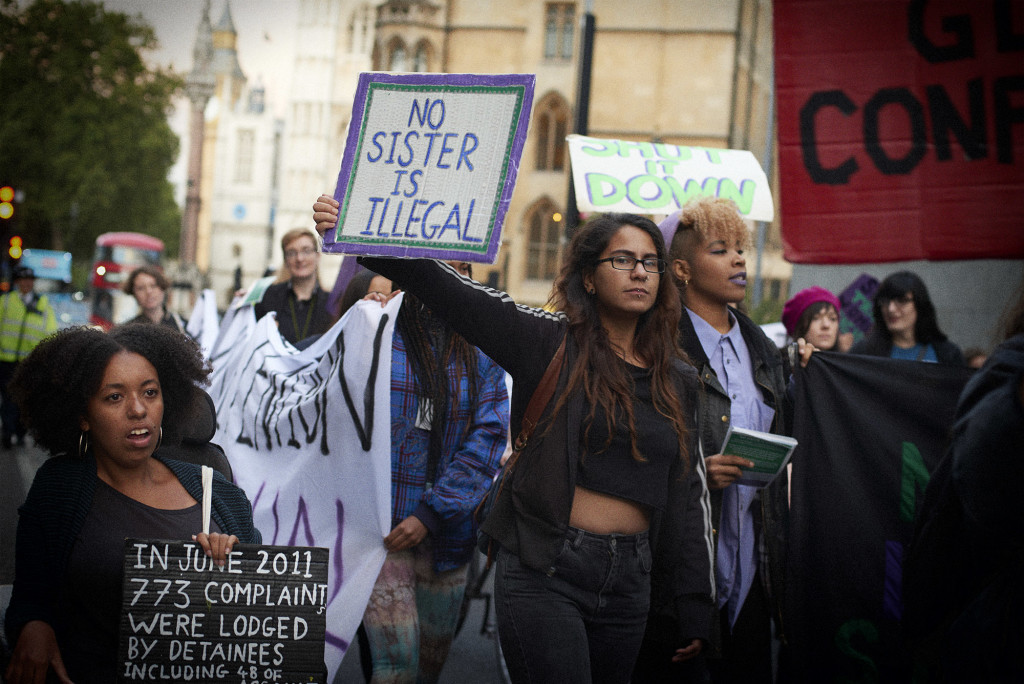
Migrant women and non-binary people face high rates of violence, but the government has sold the support services that save their lives to private security contractors with a record of abuse. By outsourcing support services to security providers, the government is forcing women and non-binary people fleeing violence to seek support from violent men.
A Call to Action
Last night, we took action against private security firm G4S two weeks before they are due to take over the Equality Advisory and Support Service, a national discrimination helpline that helps people facing sexism, racism and ableism.
The helpline was previously run by the Equality and Human Rights Commission. An open letter to the government about G4S however, states that the security contractor has “earned a reputation for serious systemic mismanagement and discrimination”. This is not the first support service that G4S has taken over, they already run two Sexual Assault Referral Centres in the West Midlands.
Specialist services working with survivors of domestic violence should not be run by private companies with a history of violence.
Since austerity began in 2010, the government has forced over 30 specialist domestic violence services to close and has outsourced many support services to private companies with minimal expertise. Specialist domestic violence support services have borne the brunt of these cuts, especially those that help black and minority ethnic (BME) women, LGBTQ+ people and disabled women. Years of knowledge is at risk when the government hands contracts (and lives) over to private security contractors.
The discrimination helpline is a lifeline for sisters fleeing violence. When specialist services are handed over to the lowest bidder, vital support is provided by people with no expertise. As housing benefit cuts take hold, over 70% of refuges will be forced to close. By scutting services the government is putting more women at risk at the hands of violent partners.
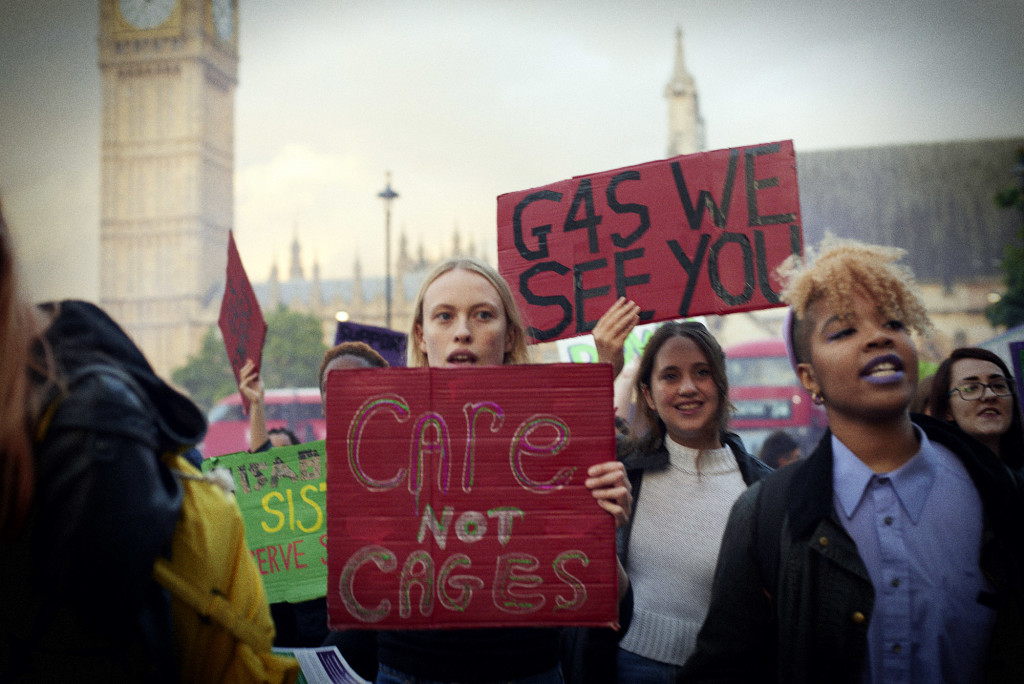
Who are G4S?
G4S describe themselves as world leading security solutions. All women and non-binary people fleeing gendered violence are entitled to safety and security regardless of their documentation, but we know that security giant G4S earn a considerable profit from the business of detainment and deportation. Not only was G4S the first private company to open and run a prison in the UK, they are the world’s largest provider of electronic monitoring (tagging), monitoring over 14,000 people in the UK alone.
Why public contracts should not go to G4S: A History of Abuse
G4S is a private company driven by profit. We do not believe that they or any other such company should have a stake in public services, yet 27% of G4S’s revenue comes from public contracts. The firm often comes under scrutiny for unfair practices, racial and gendered abuse as well as extreme use of force on detainees.
There were 773 complaints against G4S by detainees in 2010 alone, including 48 assault claims. Medical Justice’s Outsourcing Abuse report documented many incidents of excessive force resulting in injury. Many detainees were reported as suffering with PTSD as a result of abuse experienced while under the care of G4S guards. The report also noted multiple incidents of racist language used by detention security guards against imprisoned sisters.
In 2010, Jimmy Mubenga was killed by G4S guards during his forcible deportation to Angola. This is just one of the fatalities caused by the extreme violence in our border system. Following Mubenga’s death, HM Chief Inspector of Prisons condemned the “excessive” use of guards for transportation, stating that “is hard to justify against a background of reduced staffing levels across the public sector.”
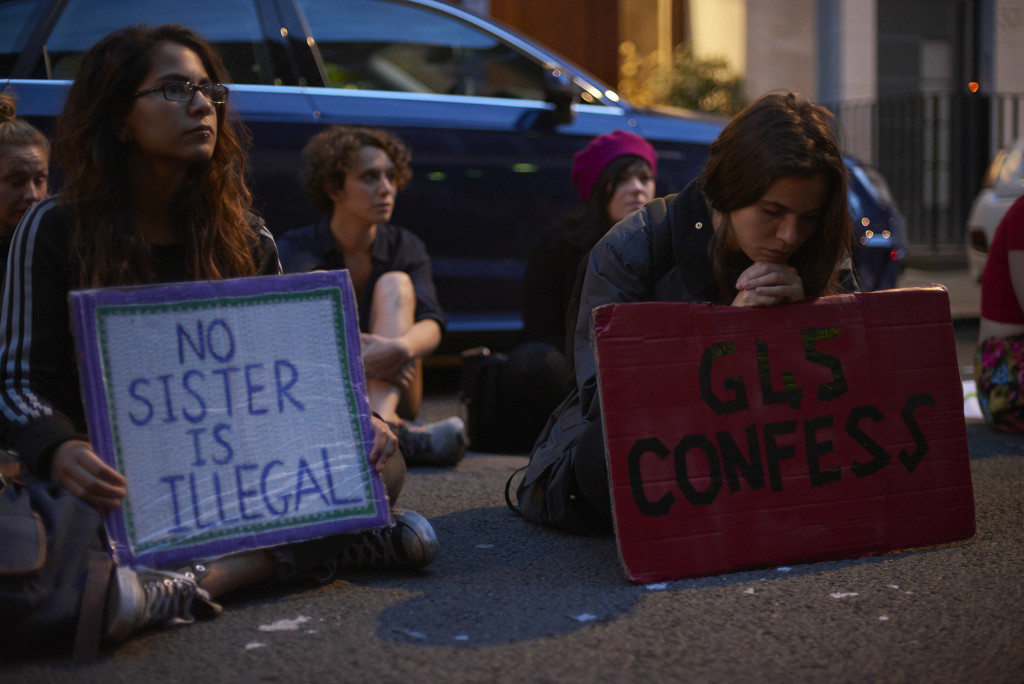
Following the news that G4S will take over the Equality Advisory and Support Service, leading Human Rights groups have criticised the government’s move, describing the security contractor as “manifestly ill-equipped to provide advice on discrimination and human rights”.
Sisters Uncut are deeply concerned about their ability to provide the support that women and non-binary people need. Migrant sisters fleeing gendered violence abroad or in the UK are at risk of being detained if they attempt to seek support with insecure immigration statuses, yet the same firm that profits from detention- is to provide advice and support to these groups.
Not only do private contractors profit from detention, but they are responsible for a range of services within the institution. This means that firms we know to have a history of violence are tasked with providing support during detention and deportation, as well as medical care for detainees and security in health facilities.
How much money to G4S make? Taxpayers’ money goes to private security companies
G4S reported a revenue of 6.4 billion in 2015, with profits if of 227 million after tax. In the same year, new contracts won by the company amounted to 2.4 billion. Not only do the security giant hold private contracts, but almost a third of their revenue comes from public services funded by taxpayers’ money. By undercutting price, G4S have taken over specialist services which is endangering those that the state should protect. Private firms like these are actively contributing to austerity.
Indefinite detention is ineffective, expensive and traumatic for sisters involved. An investigation by Corporate Watch and Stop Deportation when G4S was involved revealed that the UK Border Agency’s annual expenditure on deporting migrants and asylum seekers on chartered flights increased from £1,752,991 in the year 2002-03 to £7,870,209 in 2011-12. Yet the number of people deported decreased from 3,048 to 1,647 during this time.
It is no coincidence that G4S also currently hold a seven year contract to run medical facilities in detention centres worth £23.4 million. Holding folks in detention for extended period of times increases the number of detainees and private security firms like G4S profit from providing an array of services throughout the detention and deportation system.
The firm also sees money-making opportunities with detainees. In 2012 G4S had 400 prisoners working more than 40 hours a week for next to nothing pay. This system condones state violence against migrant sisters, private companies are profiting from pain and should not be awarded any public service contracts.
In 2013 G4S offered to return £24 million of taxpayers money when an audit by accountancy firm PricewaterhouseCoopers revealed that the security giant was overcharging for their contracts since 2005. The criminal investigation revelead that G4S had been charging the government for tagging offenders who had returned to detention, had had their tags removed, had left the country and court attendees that had never even been tagged.
Austerity is ideological. The government’s decision to sell public services to rich private companies like G4S ensures that the rich get richer. The cuts to domestic violence services, housing provision and specialist services for different groups have a devastating human cost.
We believe the government should support survivors fleeing domestic violence, not persecute them.
We demand that the government invests public money in specialist support services that know how to save lives, not to private security contractors with a record of abuse.
Thank you to everyone who joined our #NoSisterIsIllegal Week of Action against Prison and Detention aligned with the International Week of Action against Prison and Detention.
#SupportNotSurveillance
#NoSisterisIllegal: Migrant Women and Domestic Violence
Wednesday, September 14, 2016
We believe that women’s lives are more important than pieces of paper. The government does not.
When a woman is facing domestic violence and wants to flee, the most important thing is that she has a safe exit plan, and a place to go.
Within the current climate of austerity where refuge spaces are limited, social housing is scarce and private rents are astronomically high, this already makes a survivor’s decision to flee violence incredibly difficult. After all, how can she leave when there is nowhere to go?
However, migrant women who want to escape domestic violence face a whole other set of challenges heaped on top of this.
Migrant women experiencing domestic violence have to make the choice between a violent household and detention or deportation. Both of these options can be life threatening.
We already know that migrant women face a higher risk of being killed by their partners. Yet undocumented women and non-binary people are barred from accessing support when they need it most. All because they are branded as ‘illegal’. No sister is illegal; women’s lives are worth more than pieces of paper.
Restrictive immigration laws and brutal austerity cuts to specialist services leave migrant sisters with nowhere to go. Let’s explore the options of where she can go:
A refuge?
Leaving an abusive situation is dangerous and all survivors need support and safety. Refuge spaces are funded through housing benefit, so migrant women with ‘no recourse to public funds’ (no access to state support) have no access to refuges, social housing and any other benefits for that matter.
2 in 3 migrant survivors do not qualify for the ‘Destitute Domestic Violence Concession’, which provides potential lifesaving short-term access to the benefits needed to get housed in a refuge. The lack of options not only make it difficult for sisters to leave violent relationships, but sisters may become vulnerable to intensified domestic violence after an attempt to flee.
In 2014 alone, 389 women fleeing domestic violence with ‘no recourse to public funds’ were turned away from refuge spaces. What happened to them?
A privately rented home?
The Immigration Bill 2014 forces private landlords run immigration checks on tenants, commonly known as the ‘right to rent’. This forces landlords to act as border control, and ensures that privately rented homes are inaccessible to undocumented migrants. These immigration checks also affect those forced to flee without their documentation (which abusers may hold onto as a means of control), leaving many sisters without safe housing.
Neighbours? Communities?
In the post-Brexit climate, not only do sisters stand to lose the already restricted access they have to professional support services, but now migrant sisters and sisters of colour are more likely to face violence from individuals and the state. This is a result of the racist, xenophobic and islamophobic discourse that has taken a stranglehold over our country and has raised the prevalence of state violence against migrants and people of colour.
The police?
Due to the additional threat of racism, deportation and detention, the police are not an option for many migrant sisters. Migrant women and non-binary people may not even be able to access support services if their immigration status is checked while they attempt to flee.
…Immigration detention centres?
Migrant women – no matter how long they have been living in the UK – seeking safety from the police may well be taken into detention, forcibly separated from their children, and deported. They may well be taken to Yarl’s Wood, to face further violence at the hands of male guards. These guards work for private security companies known for the violence against women and migrants, and the government is increasingly handing them contracts with a duty of ‘care’ toward people.
More concerning is that contracts for vital domestic and sexual violence services for survivors have been won by the same companies involved in border control, prison and detention services. Sisters fleeing violent men are forced to seek support from violent men. This conflict of interest is deliberate, and the government is structurally expanding the reach of its border control in the most sinister way.
The absence of support services for migrant women is racist and sexist. It places the government in complicity with perpetrators.
To end violence against women, we must address the institutional and state structures that encourage it. We need domestic violence support services, not punitive immigration detention centres.
As well as punishing migrant domestic violence survivors already living in the UK, the government turns its back on survivors seeking asylum from gendered violence. The UK’s indefinite detention system has long been criticised as inhumane, costly and ineffective. The money that is used for detention should be used to save lives, not to re-traumatise women with deprivation and abuse in detention. In many cases, migrant women and non-binary people are forced onto planes to their birth countries, where they are likely to be returning to much higher risk of violence.
We demand that the government invests public money in specialist support services that know how to save lives, not to private security contractors with a record of abuse.
This is why North London Sisters Uncut are holding #NoSisterIsIllegal Week of Action against Prison and Detention aligned with the International Week of Action against Prison and Detention.
We believe the government should support survivors fleeing domestic violence, not persecute them.
Join us here: https://www.facebook.com/events/1094198713991431/
#Nosisterisillegal #ProtectionNotPersecution
#NoSisterIsIllegal: Sisters Uncut Week of Action Against Prison and Detention
Monday, September 12, 2016
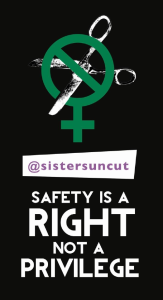
Sisters Uncut stand in solidarity with our sisters detained and imprisoned, and all those experiencing violence. Domestic and state violence are closely connected.
In domestic violence, perpetrators isolate, trap and control their victims through fear. State violence replicates the same power dynamics: the removal of support services and benefits traps fearful women in desperate situations; prison and immigration detention isolates and physically confines women, keeping them intimidated and rigidly controlled.
(more…)
Occupy vs. Reclaim: what’s in a name?
Tuesday, September 6, 2016
This summer Sisters Uncut has been reclaiming public spaces across the country. We’ve taken over corporate buildings, taken back empty council flats and marched from Newcastle to Bristol. Sisters are everywhere, taking up space, rooted in communities, fighting state and domestic violence.
And while doing all this it has been so easy to slip into the oppressive language of the system we want to dismantle. When Sisters Uncut took over an empty, soon-to-be-demolished council flat in Hackney, we called it an ‘occupation’. We occupied the flat to force the local council to provide safe and secure housing for survivors. But why choose the word ‘occupy’? A word that recalls an imperialist and violent past, and a word still tainted by racist occupations today that continue to terrorise brown and black people daily.
But the term ‘occupy’ became fashionable, catapulted to fame by the disruption and protests against financial systems and corrupt governments across the world in 2011. However, for many, particularly anyone part of global struggles against colonialism and military occupations, the term ‘occupy’ is inextricably linked with forcibly taking what is not yours at the expense of others. And with this comes imposing notions of supremacy and inferiority, racism, domination, and human rights violations.
This is so very far from what our space in Hackney represents. The flat isn’t an occupation; we haven’t stolen space that isn’t ours. It is just the opposite; we are the community and we’re taking back space that belongs to us. Social housing was created using the collective money of the people to support everyone that needed a home. These homes were decent, secure and built around existing communities. And when women faced violence at home, they campaigned, fought and won the right to safe and secure housing.
Today all of these homes are threatened by private interests and austerity policies. The Tory government is destroying all social housing and it is survivors of domestic violence who will die as a result. A woman is most vulnerable when she tries to leave, so it is imperative that there is somewhere safe and secure to go.
That is why Sisters Uncut has taken up space, taken back space. To force councils, government and private companies to realise that these spaces are ours and we will fight to keep them. Through our direct action of an empty council home, we have reclaimed what rightly belongs to the people and should be used to serve people in need, to provide homes for survivors fleeing violence. How can she leave if she has nowhere to go? The space is not one dominated by outsiders but owned and run by the community and in solidarity with non-hierarchical women and non-binary people who share in the struggle for justice against sexist austerity.
To stay true to these principles and disentangle ourselves from the systems we fight against, we will work to stop using the term ‘occupy’ in relation to our actions and instead focus on the positive term ‘reclaim’. A term that is truer to what we are actually doing and a step closer to ensuring our spaces are safe for all sisters, particularly those facing multiple oppressions.
Why Sisters Uncut support Black Lives Matter UK #shutdown
Friday, August 5, 2016
Sisters Uncut pledge our commitment and solidarity to Black Lives Matter UK and our black, queer siblings who are leading the movement on this side of the Atlantic.
Black Lives Matter is part of a long struggle by the black community against police and state brutality. Though it was founded in the US, the parallels with police and state violence in the UK cannot be ignored. We support Black Lives Matter UK in their movement against brutalisation of black people by the British state, including racist deportation, incarceration, and the murder of our loved ones. Black women and non-binary people who experience domestic violence are some of the worst affected by state violence, and Sisters Uncut see our fight for specialist domestic violence services, refuge provision and safe housing as intrinsically linked with the movement for black lives.
Sisters Uncut stands in solidarity with the Black Lives Matter movement because black people remain prisoners of a system that rewards violence and punishes poverty. A system that denies a sister a decent place to live and then guns down her children in the street for the crime of being black. That prevents her from seeking help when she is being abused because she knows that they won’t believe her because she is black. That if she does report her experience, the police are more likely to violently abuse her than protect her from harm. That her children are three times more likely to be excluded from school than their white counterparts. That mental health services don’t acknowledge the daily survival of racism as a form of trauma. The daily injustice of racist oppression in this country and the culture of patriarchal violence inflicted on black people by the state has an obvious connection with the power dynamics and intimate violence faced by women in their homes.
We stand with those marching under the Black Lives Matter movement because state violence is intrinsically connected to domestic violence. The insidious, patriarchal and racist practices of the state trickle down into our homes and our intimate relationships. Racist violence against women of colour is sanctioned and enacted by a state that violently imprisons and incarcerates people who have themselves been abused. People who are also the victims of an immigration system that traumatises, isolates and humiliates black sisters who have survived sexual violence, homophobic and transphobic abuse. We know that violence against black women and non-binary people is part of system of racist oppression that dehumanises black experiences and cultures – that tells our black sisters they are not worthy of the same support and protection as white sisters when they experience abuse .
Austerity makes the effects of racism – and the vicious rhetoric surrounding cuts to welfare, housing and support – even more acute. Specialist support services for sisters of colour have been decimated, resulting in 66% of women who need help being turned away. Meanwhile local councils in London like Southwark and Hackney leaving thousands of council homes empty or at risk of being demolished. Access to safe housing is now subject to immigration controls and tightening eligibility criteria. Our Prime Minister Theresa May refused to release information about abuse being perpetrated by guards at women’s detention centre Yarl’s Wood, whilst at the same time pledging to end violence against women and girls. She is also responsible for callous response of the UK in dealing with the migrant crisis and failing to act to prevent the deaths of 3034 refugees fleeing violence abroad. Make no mistake, this is a crisis.
If you need more proof, look at the death of Sarah Reed in January this year. A 32 year black woman who died in Holloway prison after years of institutional abuse, police brutality and inhumanity in the mental health system. Look at Joy Gardner, bound and strangled to death in her home by police in 1993. Or our brother, Sean Rigg who was killed in 2008 by police who held him face down on the floor of a police cell for 8 minutes instead of getting him the mental health support he needed. Not one police officer has ever faced charges for any of these murders, or for any of 1563 deaths in police custody since 1990. This is a crisis.
2014 figures state that only 1% of 7,963 complaints of racism by Police have been upheld over an 8 year period. This lack of accountability, and blatant abuse of power by the criminal justice is evidence of how the state normalises violence against black people. We stand against the racist police brutality enacted against black people in the UK and abroad and we stand in solidarity with United Friends and Families Campaign who have been fighting for justice for the deaths of their loved ones since 1997 and whose work inspires Sisters Uncut and @blmuk.
The effects of this racism against our black siblings is felt every single day and it cannot be ignored. Sisters Uncut stands in solidarity with Black Lives Matter because we are fighting the same enemy: racist state violence and police brutality – symptoms of state power that disproportionately affect black women. Safety is a right and not a privilege. We need to stand together and say loud and clear that around the world, black lives matter.
Make sure you get to the Black Lives Matter UK rallies happening nationwide tonight;
London – 6.30pm – Altab Ali Park
Nottingham – 6pm – St Peters Gate
Manchester – 6pm – Alexandra Park
Watch the Black Lives Matter UK video here!




